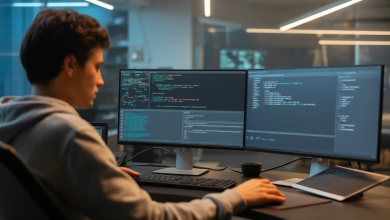The history of Automation
In 1771, Richard Arkwright invented the spinning frame (https://en.wikipedia.org/wiki/Spinning_frame), an Industrial Revolution invention for spinning thread or yarn from fibres such as wool or cotton in a mechanized way. It was driven by water power and it is the first example of automation.
And over the last century, machines have replaced workers in many tasks. We are always looking for new ways to help us do our jobs easier and faster. This is true in many industries, such as agriculture, transportation, health, etc…
In agriculture, we used to rely on animals and human labor to plant and cultivate the land. Then we invented tractors and other machines that facilitated the task and made our jobs easier, but we still had to be included in the process. Human operators were still needed to perform the tasks. Today, we have fully automated farming machines that can do basically everything with minimal human intervention.
Another example is the transportation industry. We used to have horses to pull our carriages, then we replaced these horses with more powerful engines that can take us faster and further than before. And now we got to a point where we have cars that can drive by themselves, while we sit in the back seat!
The fourth Industrial Revolution
Every industrial revolution is characterized by a certain technology: from the steam engine in the 1st industrial revolution, to the invention of electricity in the 2nd revolution, up until the digital revolution with the introduction of computers and the Internet. We’re currently living in what we call the fourth Industrial Revolution which builds on the Digital Revolution, and is mainly fueled by technologies such as Big Data and Artificial Intelligence.
The reality today is that AI is taking over large parts of the business processes that were previously done manually. And with each new addition to the AI toolbox, companies that don’t integrate AI in their businesses will fall behind in productivity and efficiency.
This is true across all industries. You don’t need to work in technology to use Artificial Intelligence to your benefit. This means no industry is immune to automation.
If you look at the vast examples of AI applications today, you can see that AI is applied in many sectors, and it’s revolutionizing any industry it enters. So in the future, AI will most likely automate many of the tasks we do today.
But how is this affecting us?
AI automation is helping companies increase efficiency & profit by producing more with less resources. According to Accenture, the impact of AI technologies on business will boost labor productivity by up to 40%.
But what about HUMANS? How is this affecting us?
From the 1st industrial revolution on, machines have prompted fears in humans. We have always been afraid that our jobs will be taken away from us and the AI revolution is no different!
We all know that AI automation is eliminating jobs in many industries. In fact, McKinsey Global Institute estimates that by 2030 automation could take away up to 30% of the existing jobs today, that’s about 800 million jobs!
But you can say that, just like any new technology, while some jobs are being partially automated or fully replaced, new jobs are being created! A study that was done by Deloitte in the UK estimated that over a period of 15 years, 800 000 jobs were eliminated due to automation but at the same time, 3.5 million new jobs were created, and with higher wages!
So what’s the problem?
If more jobs are being created than eliminated, this is good news, right?
Well, it’s not that simple!
Whereas once automation was thought to be confined to low-skilled or routine tasks, advances in technology are resulting in the automation of more highly skilled, cognitive tasks. These new jobs that are being created require more advanced skills.
So the challenge is to train and educate workers so that they can develop these skills and successfully move into future jobs, which underscores the critical importance of investing in education and skills development.
What are the essential skills for the 21st century that will allow people to succeed in their careers? Well it depends on who you ask! But one thing all experts agree on is that employees must stay in learning mode so their skills stay relevant!
Many people agree that some of the crucial skills required for the next century are
- Critical Thinking & Problem Solving
- Digital Literacy
- Creativity & Thinking outside the box
- Collaboration & Teamwork
Conclusion
Schools & universities should play their role in preparing students for a world profoundly altered by automation and AI.
But of course it’s not just students. Businesses should also focus on upskilling their current employees. And as AI enters our companies, everyone, from the CEO and business leaders to middle managers and frontline employees, will need to be familiar with some basic terminology.
Speaking the same language gets organizations on the same page and helps demystify AI’s role in the enterprise.



